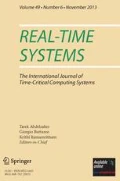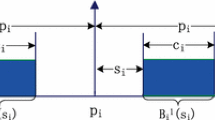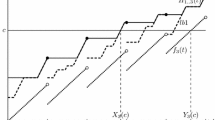Abstract
This paper gives and proves correct a simulation interval for any schedule generated by a deterministic and memoryless scheduler (i.e., one where the scheduling decision is the same and unique for any two identical system states) for identical multiprocessor platforms. We first consider independent periodic tasks, then generalize the simulation interval to tasks sharing critical resources, and subject to precedence constraints or self-suspension. The simulation interval is based only on the periods, release times and deadlines, and is independent from any other parameters. It is proved large enough to cover any feasible schedule produced by any deterministic and memoryless scheduler on multiprocessor platforms, including non conservative schedulers. To the best of our knowledge, this simulation interval covers the largest class of task systems and scheduling algorithms on identical multiprocessor platforms ever studied. This simulation interval is used to derive a simulation algorithm using a linear space complexity. Finally, a generic exact schedulability test based on simulation is presented. This test can be applied only when sustainability is consistent with online variability of the tasks’ parameters.







Similar content being viewed by others
Notes
Duration between a job release and its completion.
Period of continuous processor occupation starting at the critical instant, ignoring tasks of lower priority.
Necessary and sufficient.
Where \(\doteq \) means “equals by definition”.
See Definition 4.
Here exact means that a shorter interval would not be a simulation interval.
References
Abdeddaïm Y, Masson D (2012) The scheduling problem of self-suspending periodic real-time tasks. In: Proceedings of the 20th international conference on real-time and network systems, RTNS’12, pp 211–220. ACM, New York. doi:10.1145/2392987.2393014
Bado B, George L, Courbin P, Goossens J (2012) A semi-partitioned approach for parallel real-time scheduling. In: Proceedings of the 20th international conference on real-time and network systems (RTNS), pp 151–160. ACM, New York
Baker TP, Cirinei M (2007) Brute-force determination of multiprocessor schedulability for sets of sporadic hard-deadline tasks. In: Proceedings of the 11th international conference on principles of distributed systems, pp 62–75. Springer, Berlin
Baro J, Boniol F, Cordovilla M, Noulard E, Pagetti C (2012) Off-line (optimal) multiprocessor scheduling of dependent periodic tasks. In: Proceedings of the 27th annual ACM symposium on applied computing (SAC), pp 1815–1820. ACM, New York
Baruah S, Burns A (2006) Sustainable scheduling analysis. In: 27th IEEE international real-time systems symposium—RTSS’06, pp 159–168. IEEE, Piscataway
Baruah SK, Howell RR, Rosier L (1990) Algorithms and complexity concerning the preemptive scheduling of periodic, real-time tasks on one processor. Real Time Syst 2:301–324
Carpenter J, Funk S, Holman P, Srinivasan A, Anderson J, Baruah S (2005) A categorization of real-time multiprocessor scheduling problems and algorithms. Handbook of Scheduling
Choquet-Geniet A, Grolleau E (2004) Minimal schedulability interval for real time systems of periodic tasks with offsets. Theor Comput Sci 310:117–134
Cordovilla M, Boniol F, Noulard E, Pagetti C (2011) Multiprocessor schedulability analyser. In: Proceedings of the 2011 ACM symposium on applied computing, SAC’11, pp. 735–741. ACM, New York. doi:10.1145/1982185.1982345
Cucu L, Goossens J (2006) Feasibility intervals for fixed-priority real-time scheduling on uniform multiprocessors. In: Proceedings of the 11th IEEE international conference on emerging technologies and factory automation (ETFA), pp 397–404
Cucu L, Goossens J (2007) Feasibility intervals for multiprocessor fixed-priority scheduling of arbitrary deadline periodic systems. In: Proceedings of the design, automation and test in europe conference and exposition (DATE), pp 1635–1640
Cucu-Grosjean L, Goossens J (2011) Exact schedulability tests for real-time scheduling of periodic tasks on unrelated multiprocessor platforms. J Syst Archit Embed Syst Des 57(5):561–569
Davis RI, Burns A (2011) A survey of hard real-time scheduling for multiprocessor systems. ACM Comput Surv 43(4):35
Fohler G (1995) Joint scheduling of distributed complex periodic and hard aperiodic tasks in statically scheduled systems. In: 16th IEEE proceedings of real-time systems symposium, pp 152–161 (1995). doi:10.1109/REAL.1995.495205
Goossens J, Devillers R (1997) The non-optimality of the monotonic assignments for hard real-time offset free systems. Real Time Syst Int J Time Crit Comput 13(2):107–126
Goossens J, Devillers R (1999) Feasibility intervals for the deadline driven scheduler with arbitrary deadlines. In: Proceedings of the 6th IEEE international conference on real-time computing systems and applications, pp 54–61
Grolleau E, Choquet-Geniet A (2002) Off-line computation of real-time schedules using petri nets. Discret Event Dyn Syst 12(3):311–333
Guan N, Gu Z, Lv M, Deng Q, Yu G (2008) Schedulability analysis of global fixed-priority or edf multiprocessor scheduling with symbolic model-checking. In: 11th IEEE international symposium on object oriented real-time distributed computing (ISORC), pp. 556–560. doi:10.1109/ISORC.2008.74
Jeffay K, Stanat DF, Martel CU (1991) On non-preemptive scheduling of period and sporadic tasks. In: Real-time systems symposium, pp 129–139. IEEE, Piscataway
Jeffay K, Stone DL (1993) Accounting for interrupt handling costs in dynamic priority task systems. In: Proceedings of the IEEE real-time systems symposium (RTSS), pp 212–221
Joseph M, Pandya P (1986) Finding response times in real-time system. Comput J 29(5):390–395
Lehoczky JP (1990) Fixed priority scheduling of periodic task sets with arbitrary deadlines. In: Proceedings of the IEEE real-time systems symposium (RTSS), pp 201–213
Leung J, Merrill J (1980) A note on preemptive scheduling of periodic, real-time tasks. Inf Process Lett 11(3):115–118
Leung J, Whitehead J (1982) On the complexity of fixed-priority scheduling of periodic real-time tasks. Perform Eval 2(4):237–250
Liu CL, Layland JW (1973) Scheduling algorithms for multiprogramming in a hard-real-time environment. J ACM 20(1):46–61
Nélis V, Yomsi PM, Goossens J (2013) Feasibility intervals for homogeneous multicores, asynchronous periodic tasks, and fjp schedulers. In: Proceedings of the 21st international conference on real-time networks and systems (RTNS), pp 277–286. ACM, New York
Niehaus D (1994) Program representation and execution in real-time multiprocessor systems
Pinedo ML (2008) Scheduling: theory, algorithms, and systems, 3rd edn. Springer, New York
Pop P, Eles P, Peng Z, Pop T (2006) Analysis and optimization of distributed real-time embedded systems. ACM Trans Des Autom Electron Syst 11(3):593–625
Singhoff F, Plantec A, Dissaux P (2008) Can we increase the usability of real time scheduling theory? the cheddar project. In: Reliable Software Technologies–Ada-Europe 2008, pp 240–253. Springer, Berlin
Sun Y, Lipari G (2014) A weak simulation relation for real-time schedulability analysis of global fixed priority scheduling using linear hybrid automata. In: Proceedings of the 22nd international conference on real-time networks and systems, RTNS’14, pp 35:35–35:44. ACM, New York. doi:10.1145/2659787.2659814
Xu J, Parnas DL (1990) Scheduling processes with release times, deadlines, precedence and exclusion relations. IEEE Trans Softw Eng 16(3):360–369
Xu J, Parnas DL (2000) Priority scheduling versus pre-run-time scheduling. Real Time Syst 18(1):7–23
Acknowledgments
The authors sincerely thank the reviewers, whose remarks really helped to improve the paper. They also thank Pascal Richard, Gerard Fohler and Yves Sorel for very inspiring discussions. This research has been partially funded by the projects PIA CORAC Panda, CS ISAE-ENSMA, FUI Waruna, FP7 IP PROXIMA, IP LEOC Capacites and IP BGLE Departs.
Author information
Authors and Affiliations
Corresponding author
Rights and permissions
About this article
Cite this article
Goossens, J., Grolleau, E. & Cucu-Grosjean, L. Periodicity of real-time schedules for dependent periodic tasks on identical multiprocessor platforms. Real-Time Syst 52, 808–832 (2016). https://doi.org/10.1007/s11241-016-9256-1
Published:
Issue Date:
DOI: https://doi.org/10.1007/s11241-016-9256-1




